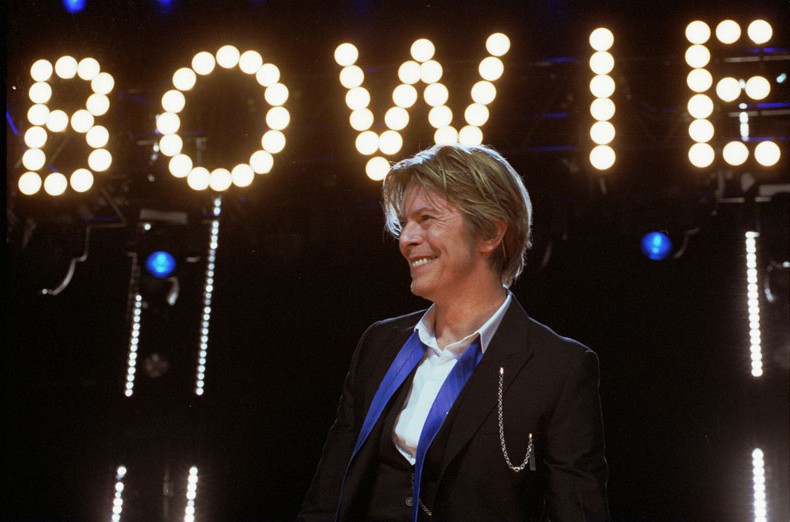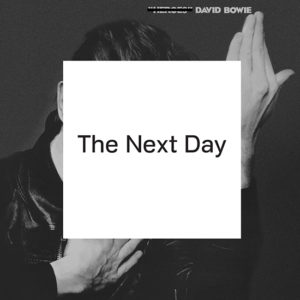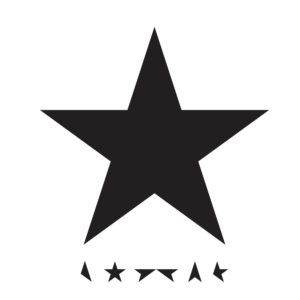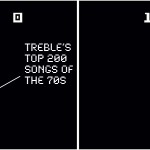Celebrate the Catalog: David Bowie

God Only Knows

Tonight
(1985; EMI)
And this is where Bowie more or less drops the ball. While Let’s Dance was by no means as strong an album as his `70s material (or Scary Monsters, which is still more or less connected to his ’70s material), it was at least a very good pop record, with several strong highlights and filler that was at least entertaining, if not necessary. Tonight is a very different story. To its credit, the album has two excellent songs: the high-energy single “Blue Jean” and the even better, lengthy opener “Loving the Alien.” Were there more songs of this caliber, Tonight might be better remembered today, rather than buried beneath the mountain of material that preceded it. But unfortunately, the remainder of the album goes from OK to awful. Frankly, the embarrassing and dated cover of the Beach Boys’ immortal “God Only Knows” is one of the worst songs Bowie has ever recorded, and his pair of reggae tunes, “Don’t Look Down” and in particular the title track, aren’t that far behind. Tonight is a prime example of how many albums in the mid-’80s suffered from overproduction. But what’s even worse is that the songs underneath aren’t even that strong to begin with. Were Bowie to pair the highlights from the album with some of his film soundtrack material from the era—”Absolute Beginners,” “This Is Not America,” etc.—this could have been a fine EP. But as it is, it’s a low point for Bowie, artistically, though thankfully not one that would last terribly long.
Rating: 5.0 out of 10

Never Let Me Down
(1987; EMI)
The low point that Bowie had sunk into with Tonight continues with Never Let Me Down, but its sins are somewhat of a different nature. While Tonight is radically polarized between a couple of excellent tracks and a glut of awful ones, Never Let Me Down mostly rides a consistent wave of mediocre. And where Tonight had an abysmal cover of “God Only Knows,” NLMD has Mickey Rourke rapping … sort of. It’s not quite as bad, but it’s close. The rest of the album, meanwhile, mostly suffers from a similar over-production problem. In fact, part of me thinks most of the songs on the album would actually be pretty good if they weren’t so riddled with embarrassing ’80s production values. Saxophones seem to pop up a lot, as well as the bizarre juxtaposition of synthesizer and harmonica. “Zeroes” goes way overboard, cramming in faux-live sounds, tabla, sitar and various other odd accompaniments. Peter Frampton wails out a solo too, for some reason. But there are rays of light, notably “Time Will Crawl” and, inexplicably, a cover of “Bang Bang,” originally on Iggy Pop’s oft-derided Party album. In Bowie’s hands, however, it’s more of a big-budget goth number, falling somewhere between Sisters of Mercy’s “This Corrosion” and Peter Murphy’s “Cuts You Up.” Never Let Me Down is not an awful album, and unlike a bulk of Tonight, doesn’t so much sound like a great artist phoning it in as it does a case of going to press before the editor has a look. That said, even its weirdest indulgences, like the spoken word art rock of “Glass Spider,” are still pretty interesting.
Rating: 6.3 out of 10

Black Tie White Noise
(1993; Savage)
David Bowie entered the `90s in a better position than he was in at the tail end of the ’80s, though the six years between Never Let Me Down and Black Tie White Noise likely gave him a little bit of direction and perspective that was missing on his past couple of records. That said, it’s still somewhat lacking, a transitional piece in which the ever-evolving artist was climbing his way back to a new creative space. Pegged as Bowie’s “jazz” album by people who have obviously never heard any jazz records, Black Tie is more accurately a kind of early ’90s electronic sophisti-pop record that blends trip-hop drum breaks with R&B flourishes and lots of slick production. Here, Bowie is teamed up with Nile Rodgers again, and while the result isn’t as good as Let’s Dance, it’s still decent. The first single, “Jump They Say,” is the strongest track here, though there are a few other interesting bits, notably his cover of Morrissey’s “I Know It’s Gonna Happen Someday.” Less successful are his covers of Scott Walker’s “Nite Flights” and Cream’s “I Feel Free.” But they’re still miles ahead of his take on “God Only Knows.” The rest is mostly downtempo club pop that’s mostly pleasant, rarely great, but almost never bad. Neither classic nor catastrophe, Black Tie White Noise is the first step on an impending upswing.
Rating: 6.6 out of 10
Hallo Spaceboy
Considering it took six years and two Tin Machine albums for Bowie to escalate from the directionless bloat of Never Let Me Down to the better focused but generally underwhelming Black Tie White Noise, the Thin White Duke went from middling to inspired in remarkably short order afterward. Released two years after Black Tie, Outside marks another turning point in Bowie’s career, kicking off a long period of creative growth and aesthetic shifts that suited his songwriting much better than the fluffier `80s sounds he had been chasing. Outside is, to some degree, very much a product of the `90s — it bears the grimy, gritty production of big-budget industrial rock, and a few months later, Bowie would actually go on tour with Nine Inch Nails. But the players involved with Outside, including Brian Eno and longtime Bowie guitarist Carlos Alomar, reveal that, despite any contemporary influences on the surface, this is very much a return to form.
Actually, maybe I should back up a little. As “form” goes, Outside is a massively complex and even sort of confusing album, even by the abstract standards of the artist who created both Ziggy Stardust and Diamond Dogs. It contains various characters and different points of view, and a plotline involving a post-apocalyptic art terrorist or something. Honestly, it’s so convoluted that it could take numerous listens to get a handle on it. But that doesn’t matter. Musically, no Cliff’s Notes are necessary. Outside is, weird plotlines or not, a stellar album. It’s definitely long, and could do with fewer segues, and even a couple tracks lopped off, but even at its unwieldy 70-plus minutes, it has a long list of highlights. Take, for instance, the stunning and atmospheric title track, or the dissonant-yet-catchy single “The Heart’s Filthy Lesson,” the pounding industrial stomp of “Hallo Spaceboy” (definitely among Bowie’s best tracks of the last three decades), or the epic closer “Strangers When We Meet.” Though it’s a difficult starting point for anyone to attempt to begin a journey through Bowie’s work, Outside is still a highly rewarding work. And unlike the three albums that preceded it, it hasn’t gotten any less palatable over time.
Rating: 8.1 out of 10

Earthling
(1997; Virgin)
By the late ’90s, just about every artist with a record contract was jumping on the electronica train and releasing records tailor-made for the raver crowd, or at least some idealized version of it (see: Madonna’s Ray of Light). Bowie was no less guilty of this, but his take on electronic music turned out quite good, despite the fact that, even in its heyday, jungle seemed like an awkward fit with rock music. So kudos to Bowie for finding a way to tackle drum `n’ bass production without it ending up a complete trainwreck. Earthling, released just two years after Outside and in the middle of a strong creative streak, occasionally goes overboard with all the sputtering jungle beats, but they never stand in the way of the songwriting, which is mostly top-notch throughout. Leadoff track and first single “Little Wonder” is classic Bowie, soaring and infectious, reaching for massive heights and punctuating them with odd effects and train whistles. And “I’m Afraid of Americans,” which was later remixed by Trent Reznor, has a malicious sensibility that Bowie has always done well, dating back to some of his darker `70s material. In fact, Earthling is very much a loud and aggressive album, and for a record released by an artist the year of his 50th birthday, it’s the youngest sounding recording he made since the early `80s. Still, it has the vision and meticulousness of a more seasoned artist, even if the jungle thing didn’t always work out.
Rating: 8.2 out of 10
More than a decade removed from each of them, neither Earthling nor “Hours…” seem like major releases in Bowie’s catalog, but the environments in which each was released couldn’t have been more disparate. The former, riding a crest of rave-culture beats and alt-rock aggression, had a fairly significant presence on MTV and alternative radio. The latter, aside from providing the impetus for an episode of VH1 Storytellers, barely even registered on media outlets. There are likely several reasons for this, one of the major ones being no connection to Trent Reznor the second time around. But it also primarily boils down to the fact that “Hours…” is a very different album than Earthling. Bowie’s fourth album in six years, “Hours…” arrived during a fruitful if not necessarily wildly experimental period, in which his efforts to stay contemporary succeeded much better than they did in the ’80s. But where Outside and Earthling were a little more radical in how they took on fairly cutting-edge material, “Hours…” is a pretty conventional rock record, and one that’s not half-bad, regardless of the middling reviews it received when it was released. It’s not a great record, and it’s even oddly conservative by Bowie standards. The landscape of popular music in 1999 had Limp Bizkit and Korn on one side, Moby and Dido on the other. Bowie’s choice clearly falls toward the latter, if slightly, which probably wasn’t a bad choice if a binary decision were to be made. In a sense, however, it presaged the onslaught of lite Britpop to come (e.g. Travis, Coldplay). But“Hours…” is also an enjoyable listen that succeeds merely by being loose, warm and comfortable. When Bowie recorded Storytellers he wasn’t draped in a long coat or suit, but a gray hoodie. And this album is sort of like the sonic equivalent of that hoodie. It’s not dressing to impress, but it feels good and has a comfortable air about it. Nobody’s going to be talking about it in 20 years the way we do Low or Hunky Dory now, but I also don’t see it being lumped in with the likes of Tonight, either.
Rating: 7.0 out of 10
Slow Burn
Barring the odd release like Pin-Ups or Tonight, you can pretty much never accuse Bowie of half-assing his work. Sure, a handful of times it’s turned out a fascinating fiasco, but it’s not laziness or lack of effort that creates such bizarre missteps. That said, there’s something to be said for the ability to relax a little. It’s an important distinction. An album like Never Let Me Down is simply too much everything, done simultaneously. And a similar complaint could be directed toward an album like Earthling, even if it’s much, much better. Still, the reason that Heathen was Bowie’s best album since Scary Monsters when it was released isn’t because it tries everything, it’s actually much to the contrary. It’s a much subtler album, overall, largely built on haunting ambient art rock with the occasional rocker. Here, Bowie is simply being Bowie, performing powerful songs produced to sound as fantastic as possible. His choice of covers this time around is impeccable, from his awesome take on The Pixies “Cactus,” to the roaring cover of Neil Young’s “I’ve Been Waiting For You,” complete with an appearance by Dave Grohl. Strongest of all is the single, “Slow Burn,” in which lead guitar duties are handled by Pete Townsend. He, of course, knocks it out of the park.
Rating: 8.5 out of 10
With 2002’s Heathen, Bowie had essentially reached his highest peak since the early ’80s, offering both an unflinching dedication to experimentation and seeking out new territory, while never allowing that adventurous spirit to overshadow the strength of his songwriting. And Reality, if anything, is just a continuation of the musical ideas explored on Heathen, just simplified and streamlined. Now, there’s a weird disconnect between the image on the cover, depicting Bowie as some kind of anime character, and the idea of “reality,” and perhaps that’s all part of the joke. But as the album goes, it’s pretty straightforward: guitar, bass, drums, piano, vocals. In short, it’s rock ‘n’ roll. There’s a general feel of classic Bowie sounds to the album, albeit updated with modern production, though some of the most thrilling moments are those where Bowie gets a little weird. His cover of the Modern Lovers’ “Pablo Picasso” is one such moment, among the more manic tracks of his more recent albums. And closing track “Bring Me the Disco King” is a real stunner, spanning nearly eight minutes and built around a jazzy piano sound. It’s a satisfying noir dirge, a bit mellow but sinister all the same. And if Bowie had truly committed to staying out of the public eye, this wouldn’t have been a bad way to close the book.
Rating: 8.3 out of 10
 The Next Day
The Next Day
(2013; ISO/Columbia)
He didn’t close the book there, however. And thankfully so. Bowie spent nearly a decade away from releasing music and performing, largely because of an extended period of recovery following a 2004 heart attack. And when he did finally reemerge at the end of 2012 with “Where Are We Now?“, his tone had changed. He was reflective, somber, melancholy. “Where Are We Now?” is, in some ways, a musing on his own aging, citing various landmarks in Berlin that he’d visited during his prolific three-year period recording and writing with Brian Eno and Iggy Pop in the late ’70s. But “Where Are We Now?” is also one of the most gorgeous songs he’d released in decades, maybe ever, with an atmospheric sound more akin to Robert Wyatt in his prime than Bowie’s trademark art rock. This was Bowie late in life, acknowledging time’s passing and loss in the most beautiful way he could. But the rest of the album? Well shit, it’s actually a pretty badass rock record. And that was maybe the biggest surprise here: The Next Day had energy and verve. It gets off to a fairly abrasive start with the distorted stomp of the title track, transitions into the baritone honk of “Dirty Boys,” soars along a hook-laden riff with “The Stars (Are Out Tonight)” and grooves Let’s Dance style in “Love Is Lost.” It’s as much a summary of Bowie’s career as it is a renewed commitment to trying new things, namely on “Where Are We Now?” and the eerie, Scott Walker-like “Heat.” Even the cover art, which depicts a the title on a white block covering the artwork for his 1977 album “Heroes”, simultaneously acknowledges the past and shrugs it off. Bowie had come a long way, and he certainly understood the gravity of having 40-plus years of being a rock icon behind him. But he also moved in the only direction he knew how: Forward.
Rating: 8.9 out of 10
 ★ (Blackstar)
★ (Blackstar)
(2016; ISO/Columbia)
When David Bowie announced the release of Blackstar, none of his fans knew that it would be his last album. He did, however. For 18 months, he battled cancer in private, and he knew that he was nearing the end. Blackstar ended up being released on Bowie’s 69th birthday, and just two days before he passed away. It’s hard to listen to the album without separating it from that fact, and it’s not supposed to be. This is an album that’s very much about Bowie saying goodbye, and he does so in as beautiful and darkly compelling a way as he possibly could. Its tone is haunting and ethereal, caught somewhere between the noir jazz of Angelo Badalmenti and recent efforts by Scott Walker. Bowie frequently addresses imagery of death and the afterlife, particularly in the devastating “Lazarus,” in which he sings, “Look up here, I’m in heaven.” Elsewhere, he addresses past weirdness in “Sue (Or in a Season of Crime),” tackles pop structure and sound in “‘Tis a Pity She Was a Whore,” and floats into gentle serenity in the wonderful “Dollar Days.” There’s no more powerful moment than the title track, however, which immediately signaled the album as being something different than what came before—something special. The 10-minute track never flashes into the climactic drama that marked his best-known works, but rather explores a thoroughly fascinating noir. It’s akin to a guided tour into the afterlife, a long strange trip that’s at once deeply unsettling and strangely calming at once. There’s no hearing this album without the pain and sadness that went into it, but it’s as fitting a celebration of Bowie’s legacy as there will ever be. He left on his terms, and I can’t imagine a greater gift for him to leave us.
Rating: 9.3 out of 10
You might also like:



Jeff Terich is the founder and editor of Treble. He's been writing about music for 20 years and has been published at American Songwriter, Bandcamp Daily, Reverb, Spin, Stereogum, uDiscoverMusic, VinylMePlease and some others that he's forgetting right now. He's still not tired of it.





